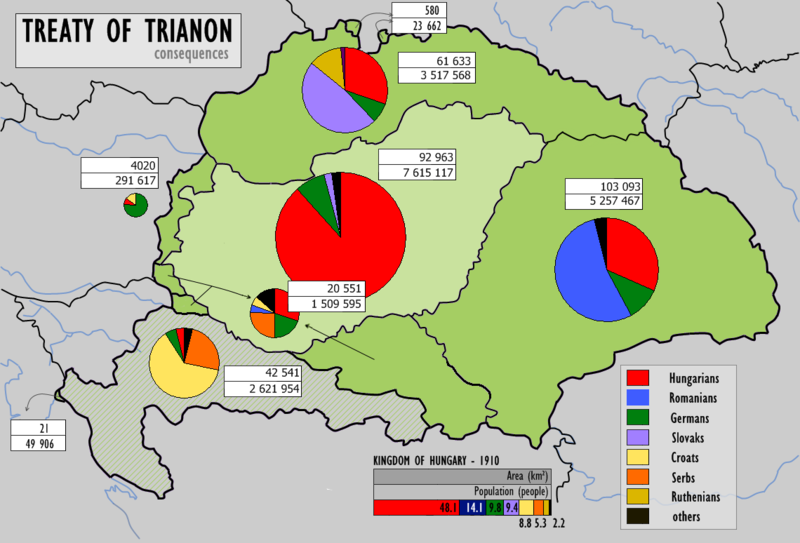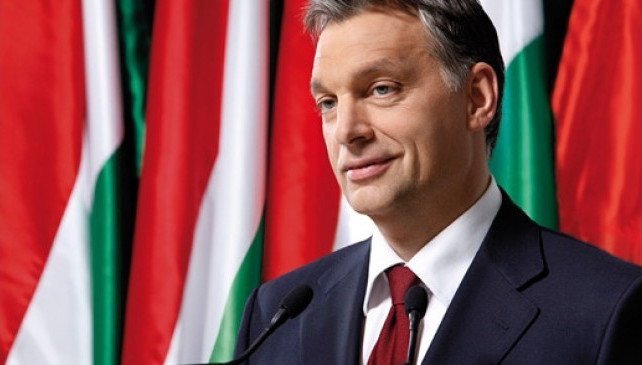At the end of WWI, the dissolution of the Austro-Hungarian Empire was followed by the formalization of Hungary’s borders in the Treaty of Trianon. Written on June 4th 1920, it was mainly a peace agreement between Hungary and the Allied powers. Today, it leaves a bitter memory in Hungarian history. On one side, it can be attributed to the creation of the modern Hungarian state. But more importantly, as one of the losing parties in the war, Hungary lost territory that it previously controlled, and to add insult to injury roughly 30% of ethnic Hungarians were left outside of its new borders.

This has had a major effect on identity and politics within Hungary. For the right-wing party in power, FIDESZ, this is a scar in the Hungarian national identity that shows Hungarians as victims of victor’s justice rather than a nation that was forced to pay for choosing the wrong side in WWI. They refuse to commemorate the treaty, even with the centennial anniversary coming up in 3 years. Instead of acknowledging the treaty, its anniversary has become the Day of National Cohesion.
Today, with Hungary in the EU, it is not too far from a hybrid form of ethnic unity. While Hungarian nationalists would undoubtedly prefer having their borders widen to bring in their kin, having open borders is a simpler alternative for many reasons, most important of which being regional stability. It is unrealistic to expect Hungary to provoke a war in order to conquer lost land and unify ethnic Hungarians into one state. However, with its current leadership, the policies of Europe’s ‘illiberal democracy’ deserve attention.
Europe has not had a major war since WWII, but the only wars that have occurred since then were about a similar issue; a desire to redraw Yugoslavia’s borders to accommodate nationalist ambitions of its multiple ethnic groups. Viktor Orbán, a Eurosceptic strongman who has been in the spotlight many times, such as against the European Union line on the refugee crisis or his attempt to close down the Central European University, resembles many of the modern strongmen that have advocated strong national policies. Though his actions are constrained by the EU, it is hard not to make comparisons with Putin or Erdogan, two other strongmen without such constraints, both of whom have been involved in conflicts in foreign lands that their countries have a historical claim to. Though the issue is not as pronounced today as it once was, tensions were very high in the period right after the fall of communism, slowly improving while Hungary and its neighbors worked towards joining the EU, which has changed the regional norms for conflict resolution.
Instead of dealing with these historical ethnic separations the same way that Serbia’s Milosevic did (organizing an ethnic separatist movement in Bosnia and Croatia), that Putin did (organizing an ethnic separatist movement in Georgia and Ukraine), or that Erdogan did (helping fund and train many Turkmen and Islamist soldiers within Northern Syria which are heavily dependent on Turkish support), Hungary’s approach has been to increase support to Hungarians outside Hungary’s borders.
The most important of such policies was to grant passports to such Hungarians. This has many benefits to ‘national cohesion’ but it also complicates factors for neighboring countries who see this as a risk of losing the loyalty of some of its citizens. It shows outsiders the Hungarian idea of state identity, as this is a push for ethnic nationalism, which supports a wide view of a state which focuses on ethnic purity and homogeneity, instead of civic nationalism which supports inclusion of diverse citizenry within a geographically defined state. While it is a different case that cannot be properly compared, it is nonetheless worth noting that Russia gave Russian passports to citizens of South Ossetia before the Russian-Georgia conflict.
The difference may lie in what the political ramification are for such actions. For Russia, giving passports out to Georgian citizens gave them the ability to claim that its later actions were justified in protecting Russian citizens. Meanwhile, Hungarians must apply to receive a passport, and those that do so are then given the right to vote in Hungarian elections. It is believed that this was the intended effect, as these new Hungarian citizens will owe FIDESZ for reconnecting them to their estranged homeland. Since these recent changes, the political landscape in Hungary has remained more or less the same, with FIDESZ and Orbán and their coalition partners KDNP holding the majority of Hungarian Parliament.
The long term consequences of such policies are yet to be seen. But the contradictions in regime policy are clear. The Central European University was targeted by the state as ‘Soros University’ for promoting liberal ideas and receiving much of its funding straight from the Hungarian born billionaire George Soros. This is evident in the personal spat between Soros and Orbán which has (according to Orbán) reached a state of war. Hungarian parliament passed a law which regulates foreign universities to such a degree that gives the Central European University only two options: spend vast amounts of money to satisfy the new requirements or shut down. This is part of a greater effort not limited to Hungary which targets foreign funded NGOs under the belief that such organizations turn into tools for foreign governments to push their agendas in a particular country.
Such laws are not uncommon, and with valid reasoning. Foreign funding to promote regime change remains a common strategy that nations undertake and should not be ignored by nations interested in their own security. But claiming that groups that receive funding from outside of the country are a threat because it allows for external influence is an easy lie to discredit them. Many foreign funded NGOs tackle issues for the sake of improving society, not to overthrow a regime. The problem lies in the fact that it is difficult for local groups to gain domestic funding if they are interested in tackling a problem that the regime profits from, such as corruption that benefits the ruling party. A government chooses which civil society groups to give its limited funding to, and this results in a competition between organizations in which pro-regime organizations are given the upper hand. When the government does not give grants to organizations because it sees them as a threat or does not agree with their message, these organizations are forced to look for funding elsewhere, or give up on their goals.
While the government is by no means obligated to give grants to any organization, much less ones that it politically disagrees with, it should not be surprised when these same organizations look elsewhere for funding. To stigmatize organizations that do this is a form of limiting discussion that doesn’t speak well for a country. It is no coincidence that ‘illiberal democracies’ and authoritarian states are more likely to target foreign funded organizations then developed democracies, which already have a healthy and uncensored civil society. To this cause, labelling organizations by where they receive funding from instead of by their actions is a way of limiting debate and discrediting those that disagree with the regime’s party line.
Given the animosity between Soros and Orbán, it is not unlikely that Soros is interested in Hungarian regime change. However, Orbán should be able to appreciate the good that Soros’ money has done for Hungary; Orbán himself received a scholarship from the Soros Foundation that allowed him to study abroad, without succumbing to the supposed ultra-liberal brainwashing that Soros is pushing on Hungary. Orbán claims that by giving passports to Hungarians outside of Hungary, he is trying to reconnect them with their native homeland, and Soros is doing just that and more with the money that he is putting into Hungary. Orbán’s response is to try and stop this, which shows that perhaps he is only interested in national cohesion if it’s by his rules.


0 comments